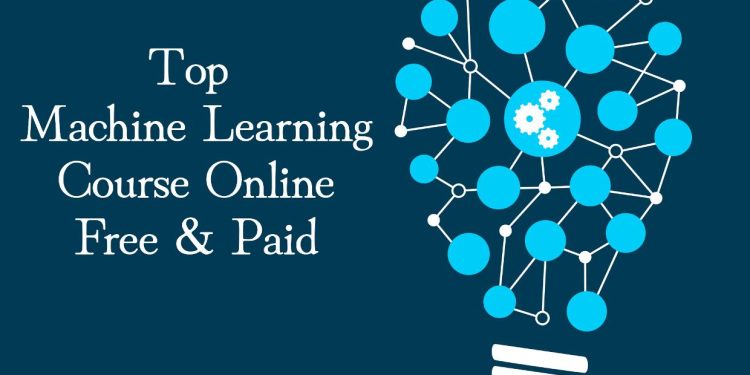As the field of machine learning continues to grow, there is an increasing demand for professionals with the skills and knowledge to develop and implement machine learning solutions. Whether you’re a data scientist, engineer, or business professional looking to expand your skillset, pursuing an online machine learning course can help you stand out in the job market and take your career to the next level.
To help you get started, we’ve compiled a list of 15 top-ranked online machine-learning certificates that you can pursue in 2023. These certificates are offered by reputable institutions and are designed to provide you with the theoretical knowledge and practical skills needed to succeed in the field of machine learning.
Here are our top 3 picks for the best machine-learning course in 2023:
Check out the 15 best machine learning courses below that will help you cement a spot in this ever-growing industry!
List of Best Machine Learning Courses in 2023
1. Machine Learning Specialization

This is one of, if not the highest-rated machine learning programs on Coursera. It is conducted by some of the most highly experienced instructors, who are also rated as “Top Instructors” on Coursera for their exceptional manner of approaching this specialization. It is ideal for beginners who are looking to switch careers to machine learning. This specialization is a 3-month long program and is divided into 3 separate courses. They are –
- Supervised Machine Learning: Regression and Classification
- Advanced Learning Algorithms
- Unsupervised Learning, Recommenders, Reinforcement Learning
The courses in the specialization use an open-source programming language called Octave which makes it easier for students to understand the host of concepts in machine learning. Additionally, the math that is necessary to go through the topics in this specialization is well discussed with plenty of examples.
Topics Covered:
- Regularization to Avoid Overfitting
- Gradient Descent
- Supervised Learning
- Linear Regression
- Logistic Regression for Classification
- Artificial Neural Network
- Xgboost
- and more… Check out the full list of topics covered here.
Prerequisites: Basic coding knowledge (for loops, functions, if/else statements) & high school-level math (arithmetic, algebra).
Rating – 4.9
Duration – 3 months; 9 hours/week
Certificate – Yes
2. Deep Learning Specialization
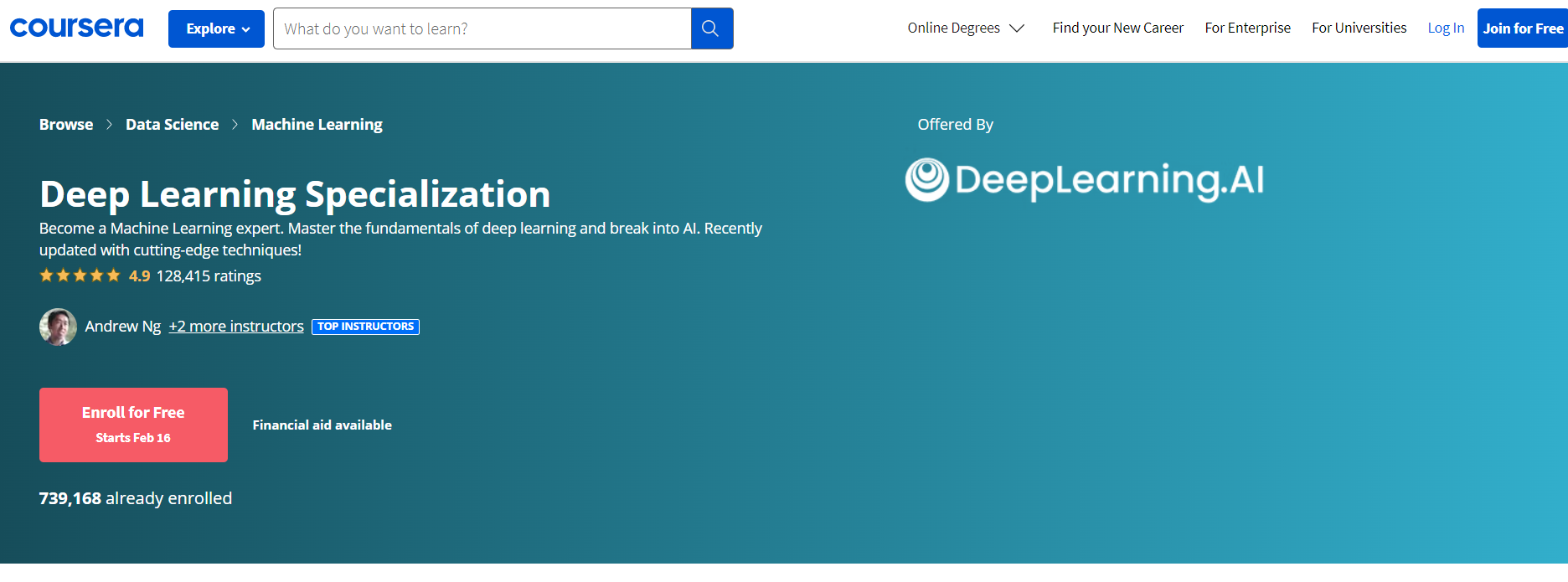
This is another highly-rated specialization led by the same group of instructors as the first specialization. It requires an intermediate level of understanding of Python, making it ideal for those who want to build their knowledge base on Deep Learning and Neural Networks. It will help you understand the capabilities, challenges, and consequences of deep Learning and prepare you to engage in the development of cutting-edge AI technology.
The specialization is divided into 5 distinct courses. They are –
- Neural Networks and Deep Learning
- Improving Deep Neural Networks: Hyperparameter Tuning, Regularization, and Optimization
- Structuring Machine Learning Projects
- Convolutional Neural Networks
- Sequence Models
Topic covered:
- Deep Learning
- Artificial Neural Network
- Backpropagation
- Python Programming
- Neural Network Architecture
- Tensor flow
- Deep Learning
- Mathematical Optimization
- hyperparameter tuning
- and more… Check out the full list of topics covered here.
Prerequisites – Intermediate Python skills: basic programming, understanding of for loops, if/else statements, data structures, and a basic grasp of linear algebra and machine learning.
Rating – 4.9
Duration – 5 months; 8 hours/week
Certificate – Yes
3. Machine Learning with Python
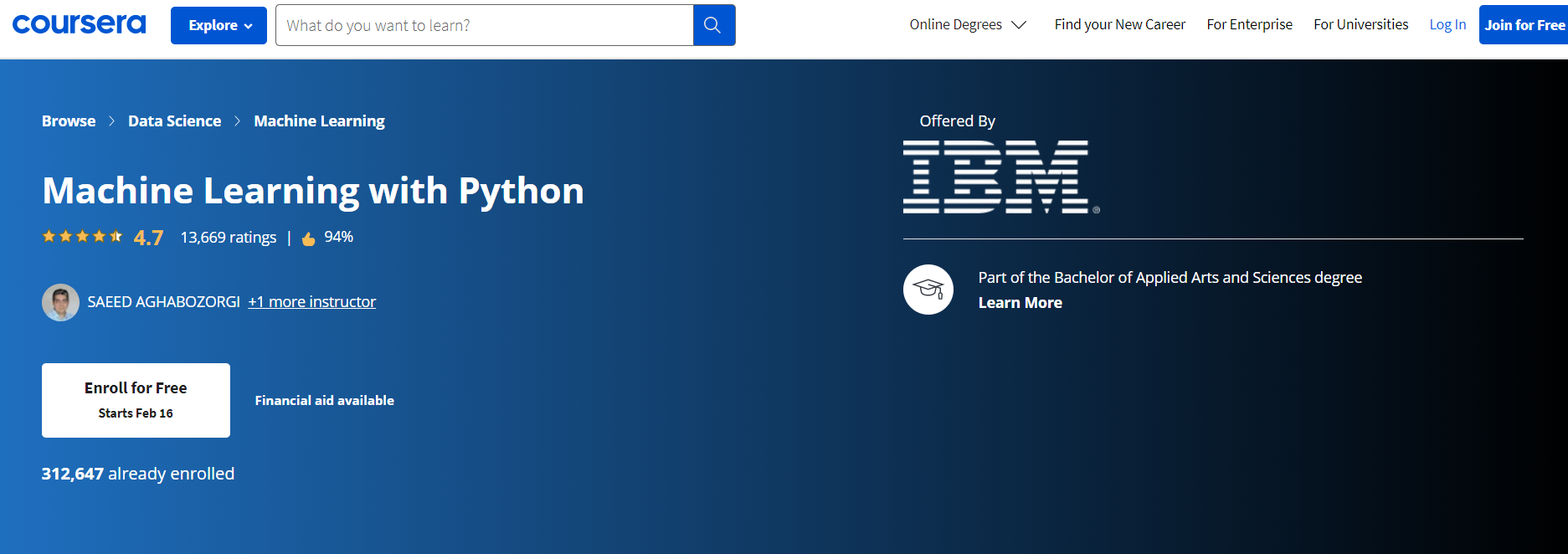
Dive into the world of machine learning with Python as your weapon of choice! This should be your go-to course whether you want to advance your career in Data Science or get started in machine learning and deep Learning. The course will take you through simple topics such as supervised vs. unsupervised Learning and linear and non-linear regression and then dive into classification techniques using the different algorithms of classification, namely K-Nearest Neighbours, decision trees, and Logistic Regression.
This course places huge importance on hands-on Learning, where you will be working with Python Libraries like SciPy and sci-kit learn and also get the opportunity to apply your knowledge through labs.
Topics Covered:
- Introduction to Machine Learning
- Regression
- Classification
- Clustering
- Recommender Systems
- Final Project
Prerequisites – A working knowledge of Python and Data Analysis and Visualization techniques. A minimum of high school math.
Rating – 4.7
Duration – 13 hours; Self-paced
Certificate – Yes
4. Mathematics for Machine Learning Specialization

In order to understand the ins and outs of machine learning, a comprehensive understanding of Mathematics is crucial. This program is just for that. It will help you build your base in increasing your awareness around the notion of Mathematics in machine learning. The specialization will take you through concepts such as Linear Algebra, Multivariate Calculus, and Dimensionality Reduction with Principal Component Analysis.
The program is split into 3 different courses. They are –
- Mathematics for Machine Learning: Linear Algebra
- Mathematics for Machine Learning: Multivariate Calculus
- Mathematics for Machine Learning: PCA
Topics Covered:
- Eigenvalues And Eigenvectors
- Principal Component Analysis (PCA)
- Multivariable Calculus
- Linear Algebra
- Basis (Linear Algebra)
- Transformation Matrix
- Linear Regression
- Vector Calculus
- Gradient Descent
- Dimensionality Reduction
- Python Programming
Prerequisites – Internet connection and no prior experience required
Rating – 4.6
Duration – 4 months; 4 hours/week
Certificate – Yes
5. Intro to Machine Learning with TensorFlow
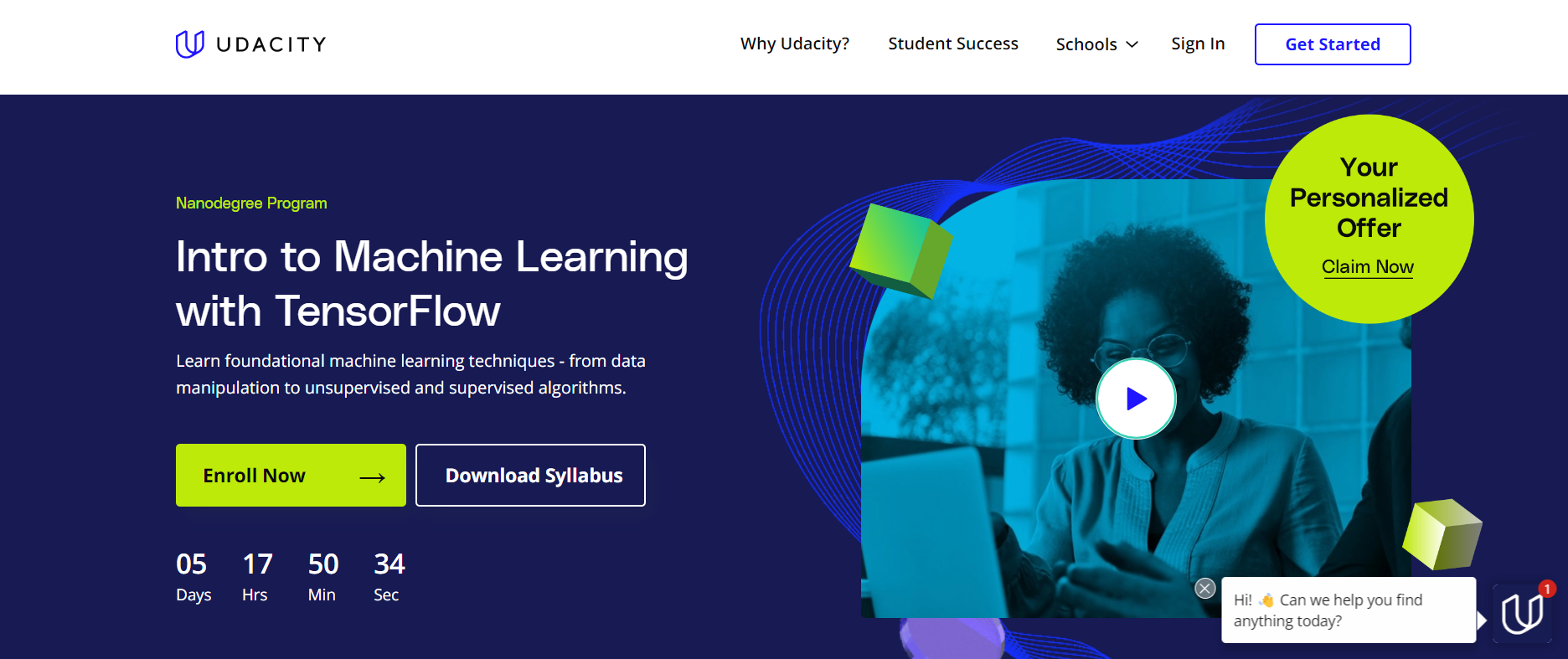
This nano-degree Program from Udacity will help you build foundational knowledge of machine learning algorithms starting from data cleaning and supervised models to deep cleaning and unsupervised Learning. The specialization is great for those who are familiar with data structures such as dictionaries and lists and have experience in Python but are looking to learn more about Machine Learning concepts.
The specialization is divided into 3 distinct courses. they are –
- Supervised Learning
- Deep Learning
- Unsupervised Learning
Each course is accompanied by a project which the enrolling students will have to complete before proceeding to the next one. The topics are explained through industry-based examples, and the students get plenty of practice exercises to work on.
Topics Covered:
- Supervised Learning
- Common class method for model construction
- Neural network design
- Training in TensoFlow
- Implementing unsupervised learning methods
Prerequisites – Intermediate knowledge of Python programming and basic knowledge of probability and statistics
Rating – 4.7
Duration – 3 months; 10 hours/week
Certificate – Yes
6. AWS Machine Learning Engineer

This is yet another nano-degree program that is designed for individuals who possess a basic understanding of Machine Learning and the concepts around it. Students who enroll can look forward to gaining a ton of practical experience using Amazon SageMaker to release trained models into web applications and monitor the performance of the deployed models.
It is a 5-month long specialization that is divided into 4 modules and a final capstone project about monitoring the inventory in distribution centers. The 4 modules under this specialization are –
- Introduction to Machine Learning
- Developing Your First ML Workflow
- Deep Learning Topics within Computer Vision and NLP
- Operationalizing Machine Learning Projects on SageMaker
- CAPSTONE PROJECT: Inventory Monitoring at Distribution Centers
Topics Covered:
- Exploratory data analysis through SageMaker
- Creating Machine Learning workflows
- Data cleaning and feature engineering
- Hyperparameter tuning
- Machine learning engineering
- Deploying a model using SageMaker
- Artificial neurons and neural networks
- Deploying professional machine learning projects on SageMaker
Prerequisites – Intermediate knowledge of Python programming and machine learning algorithms
Rating – 4.6
Duration – 5 months; 10 hours/week
Certificate – Yes
7. Deep Learning

If you’re someone who is an intermediate in Python and Linear Algebra and want a comprehensive learning experience with a focus on deep Learning, then this is the course for you. The course will teach you how to construct convolutional networks for image recognition, reconstruct networks for multiple sequence generation, and generative adversarial networks for picture generation.
The specialization is 4 months long and is divided into 4 courses with a special project at the end of every course. They are –
- Introduction to Deep Learning
- Convolutional Neural Networks
- RNNs & Transformers
- Building Generative Adversarial Networks
Topics Covered:
- Fundamentals of Deep Learning
- Design constructs of neural networks
- Optimization of neural network training
- Convolutional neural networks (CNN)
- Usage of CNNs for object detection and semantic segmentation
- RNN architectures
- Working on architectures like DCGAN, CycleGAN, ProGAN, and StyleGAN
Prerequisites – Intermediate knowledge of Python programming, linear algebra, derivatives, Numpy, and Pandas.
Rating – 4.7
Duration – 4 months; 10 hours/week
Certificate – Yes
8. Machine Learning with Python: From Linear Models to Deep Learning
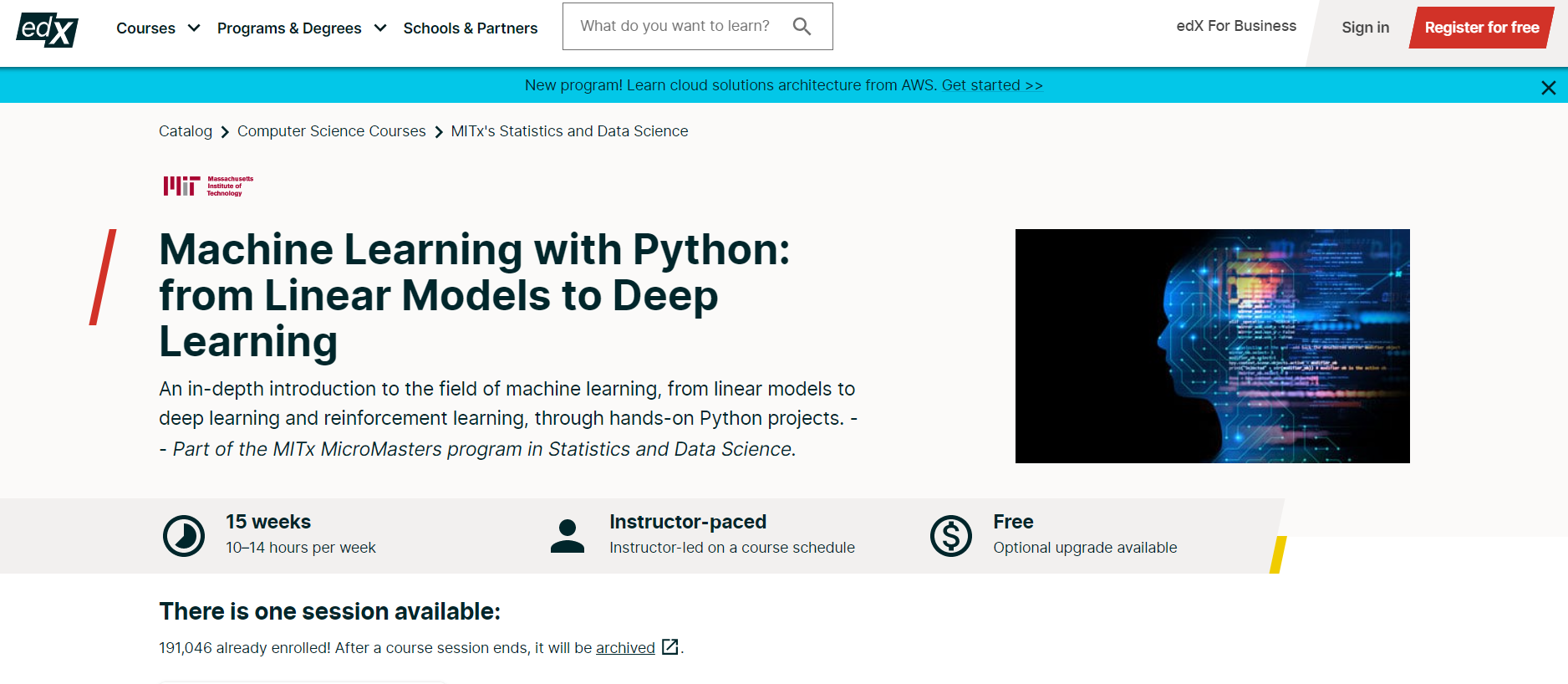
This course by MIT is an extensive deep dive into the world of machine learning. You will be learning about utilizing machine learning to turn data sets into automated predictions of future data. Additionally, there will also be three distinct machine-learning projects for you to work on, post which you will have developed a strong base and be ready to construct models of your own.
However, it is important to note that this specialization is not for beginners. Knowledge of linear algebra, calculus, and statistics is needed to reap benefits from this course. It is also instructor-led, and you will be expected to spend at least 10-14 hours per week on this course. Therefore, if your schedule is already tight, this course might not be the best option for you.
Topics Covered:
- Linear classifiers, separability, perceptron algorithm
- Maximum margin hyperplane, loss, regularization
- Stochastic gradient descent, over-fitting, generalization
- Linear regression
- Recommender problems, collaborative filtering
- Non-linear classification, kernels
- Learning features, Neural networks
- Deep Learning, backpropagation
- and more… Check out the full list of topics covered here.
Prerequisites – Intermediate knowledge of linear algebra, calculus, and statistics is required.
Rating – 4.8
Duration – 3.5 months; 10-14 hours/week
Certificate – Yes
9. Machine Learning A-Z™: Python & R in Data Science [2023]
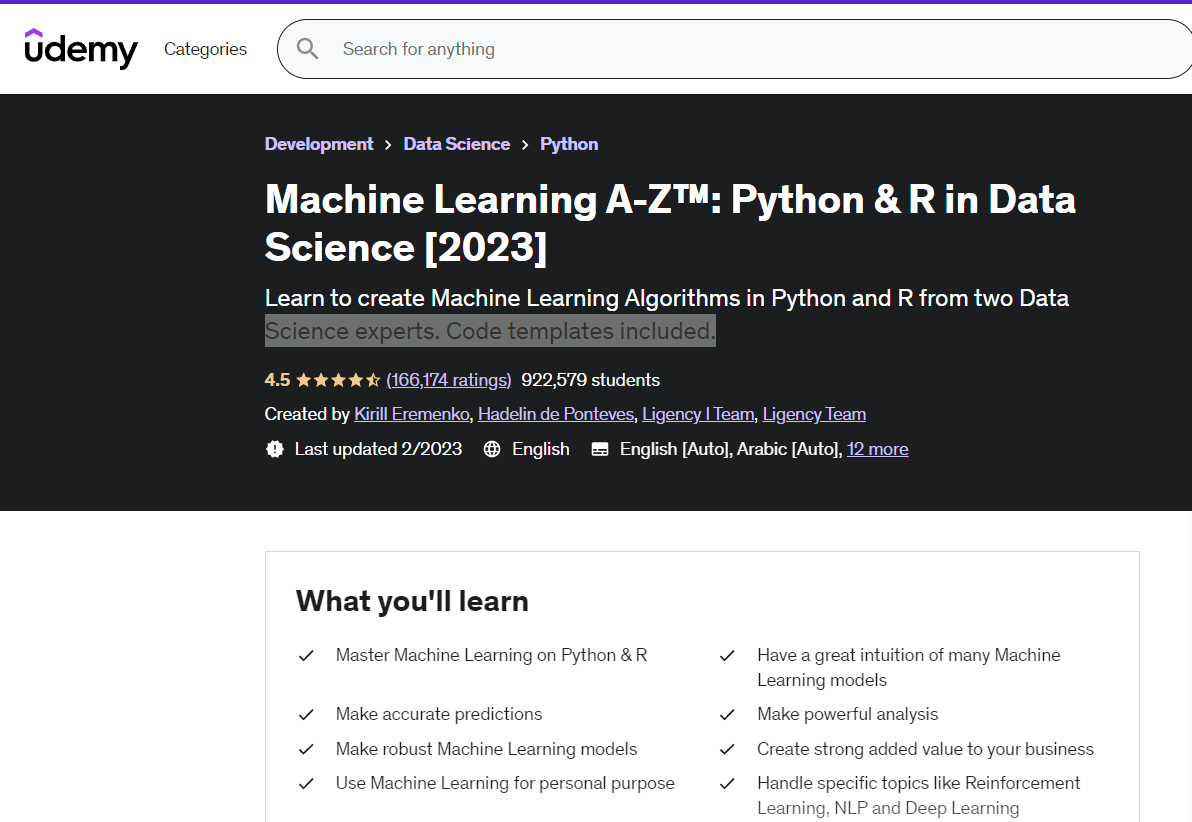
One of the few online courses that offer machine learning coaching for both Python and R, it is arguably the best option for beginners to consider. The course is well-structured and concise, with ample supplementary resources. Another noteworthy aspect of this course is you can choose to complete the program with either of the programming languages or finish with both.
The length, of course, is 42 hours long, meaning each part (Python and R) will be assigned 21 hours worth of content. Additionally, you will also have lifetime access to the content after purchasing it.
Topics Covered:
- Data Preprocessing
- Regression: Simple Linear Regression, Multiple Linear Regression, Polynomial Regression, SVR, Decision Tree Regression, Random Forest Regression
- Classification: Logistic Regression, K-NN, SVM, Kernel SVM, Naive Bayes, Decision Tree Classification, Random Forest Classification
- Clustering: K-Means, Hierarchical Clustering
- Association Rule Learning: Apriori, Eclat, and more… Check out the full list of topics covered here.
Prerequisites – Course information requires you to have knowledge of high-school mathematics, but reviews suggest you need a basic understanding of computer science and should be able to code in Python or R.
Rating – 4.5
Duration – 42 hours; Self-paced
Certificate – Yes
10. Become a Machine Learning Engineer for Microsoft Azure

If you’re wondering how to get into machine learning and become a data scientist or a machine learning engineer, this course is designed for you. This program will enable you to build advanced models and deploy them with the use of open-source frameworks and tools. Microsoft Azure is one of the most popular machine-learning platforms out there, and you will get the opportunity to design, create, configure, and optimize frameworks within it.
The specialization is divided into 2 courses, post which you will attempt to complete a capstone project on training and deploying a machine learning model in Azure. The courses are –
- Using Azure Machine Learning
- Machine Learning Operations
- Capstone Project
Topics Covered:
- Configuring machine learning pipelines in Azure
- Identifying use cases for Automated Machine Learning
- Managing pipelines in Azure
- Harnessing the power of Azure’s pipelines
- Ways of implementing machine learning
Prerequisites – Experience with basic Python programming and familiarity with fundamentals of algebra, statistics, and data distributions.
Rating – 4.5
Duration – 3 months; 5-10 hours/week
Certificate – Yes
11. AI Engineer using Microsoft Azure

An excellent sequel course to the #10 on this list, this nano-degree program analyzes the applications of Azure tools like Azure Cognitive Services, which is used to create end-to-end Azure artificial intelligence solutions. While the previous course focused more on Azure machine learning, the focus in this specialization shifts to the applications of this widely used machine learning platform.
Additionally, this course requires the students to possess a foundational knowledge of Microsoft Azure. It should also be aware of working with Azure SQL, Azure Data Lake, JSON, and REST API.
Topics Covered:
- Developing computer visions solution using Azure
- Constructing NLP and conversational artificial intelligence solutions with Azure
- Building knowledge mining solutions using Azure Cognitive Search
- Create solutions using different vision-based Azure Cognitive services
- Responsible artificial principles
- Implementation of Azure Text and Speech Cognitive Services in applications
- Designing Azure Cognitive Search Solution
- Building an AI-enriched data mining application from end-to-end
Prerequisites – Intermediate Python programming skills and working knowledge of Microsoft Azure and Azure data sources
Rating – 4.4
Duration – 3 months; 5-10 hours/week
Certificate – Yes
12. Machine Learning DevOps Engineer

This is an area that online machine-learning courses seldom cover. This nano-degree course is one of the few online courses that explore this aspect of machine learning in depth to help you gain the skills required to streamline the workflow of machine learning model creation. Moreover, if you want to bridge the gap between development and operations in machine learning projects, you can also consider DevOps certification program. It’s designed to equip you with the knowledge and tools to effectively manage machine learning models’ deployment, monitoring, and scaling in production environments.
Like the other nano-degree programs that are mentioned on this list, you will get the chance to work on several industry-specific and real-world projects. The specialization is bifurcated into 4 different modules, which are followed up by a project that the students will need to attempt before proceeding to the next one. The modules are –
- Clean Code Principles
- Building a Reproducible Model Workflow
- Deploying a Scalable ML Pipeline in Production
- Automated model scoring and monitoring
Topics Covered:
- Deploying production machine learning models
- Learn how to use PyLint and AutoPEP8
- Best practices associated with testing and logging used in different productions settings
- Adopting reproducible workflows
- Fundamentals of MLops
- Learning about technologies like Kubernetes, Kubeflow, and Great Expectations
- Checking bias in production models
- and more… Check out the full list of topics covered here.
Prerequisites – Need prior experience with Python and Machine Learning
Rating – 4.6
Duration – 4 months; 10 hours/week
Certificate – Yes
13. Machine Learning Literacy
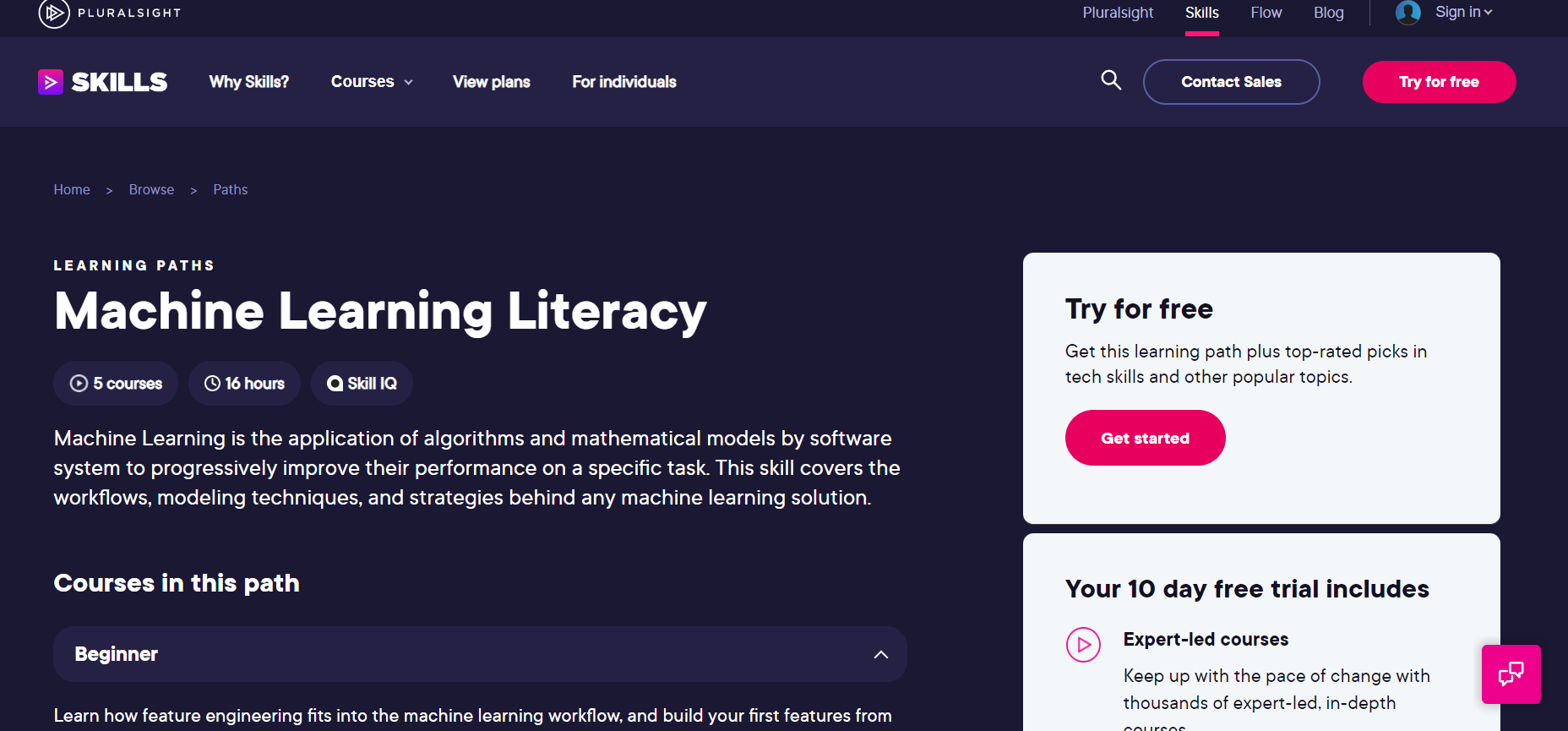
This Machine Learning course by Pluralsight is a three-tiered learning program that is suitable for beginners as well as advanced learners. It explores the different modeling techniques, workflows, and algorithms that drive machine learning-based solutions for sophisticated programs.
At the beginner level, students will learn about feature engineering and how it is used to create features from numerical data. Clearing this beginner course will set you on the path to completing the intermediate-level content, where candidates will learn to deal with nominal data such as names, categories, and types.
At the advanced level, the students will be taken through implementing all that they have learned into practical examples and extracting features from texts and documents.
Although this course is for beginners, it is still advised to be aware of concepts of statistics and data literacy before enrolling for it.
Topics Covered:
- Building features from numerical data
- Preparing data for machine learning
- Building your first machine-learning solution
- Designing a machine learning model
- Creating machine learning models
- Deploying machine learning solutions
Prerequisites – Familiarity with concepts like data literacy, data analytics literacy, and statistics.
Rating – 4.6
Duration – 16 hours; Self-paced
Certificate – Yes
14. Machine Learning Scientist with Python
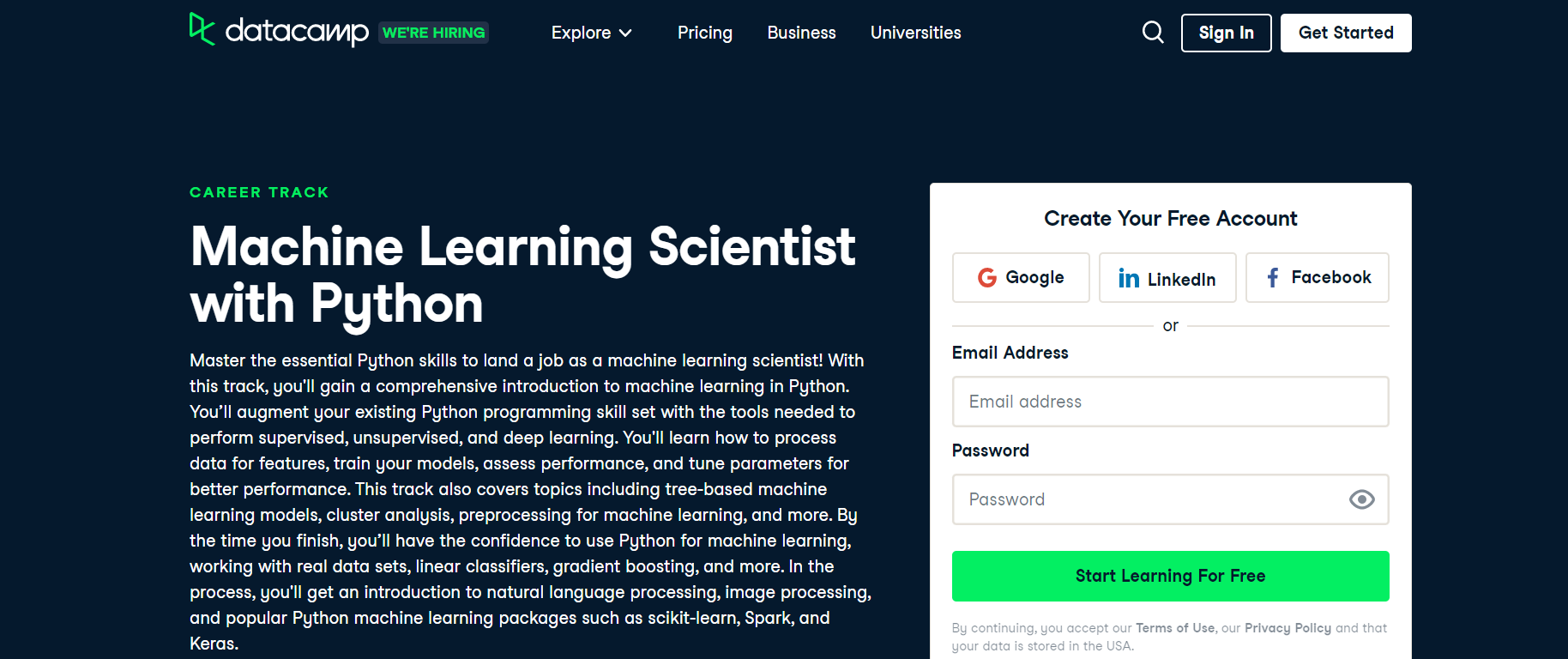
If you’re a beginner in machine learning and are looking for guidance on steps to follow to make it big in this industry, then this career track by datacamp is for you. You will be taken through a vast array of concepts, such as processing data for features, training different learning models, cluster analysis, and more!
There are a total of 23 courses in this comprehensive program which are explained by 24 different lecturers with varying experiences. Each course will take approximately 4-5 hours of time to complete.
Topics Covered:
- Supervised Learning with Scikit-learn
- Unsupervised Learning in Python
- Linear classifiers in Python
- Machine Learning with tree-based models in Python
- Extreme gradient boosting with XGBoost
- Cluster Analysis in Python
- Dimensionality Reduction in Python
- and more… Check out the full list of topics covered here.
Prerequisites – A stable internet connection
Rating – 4.4
Duration – 93 hours; Self-paced
Certificate – Yes
15. Understanding Machine Learning [DataCamp]
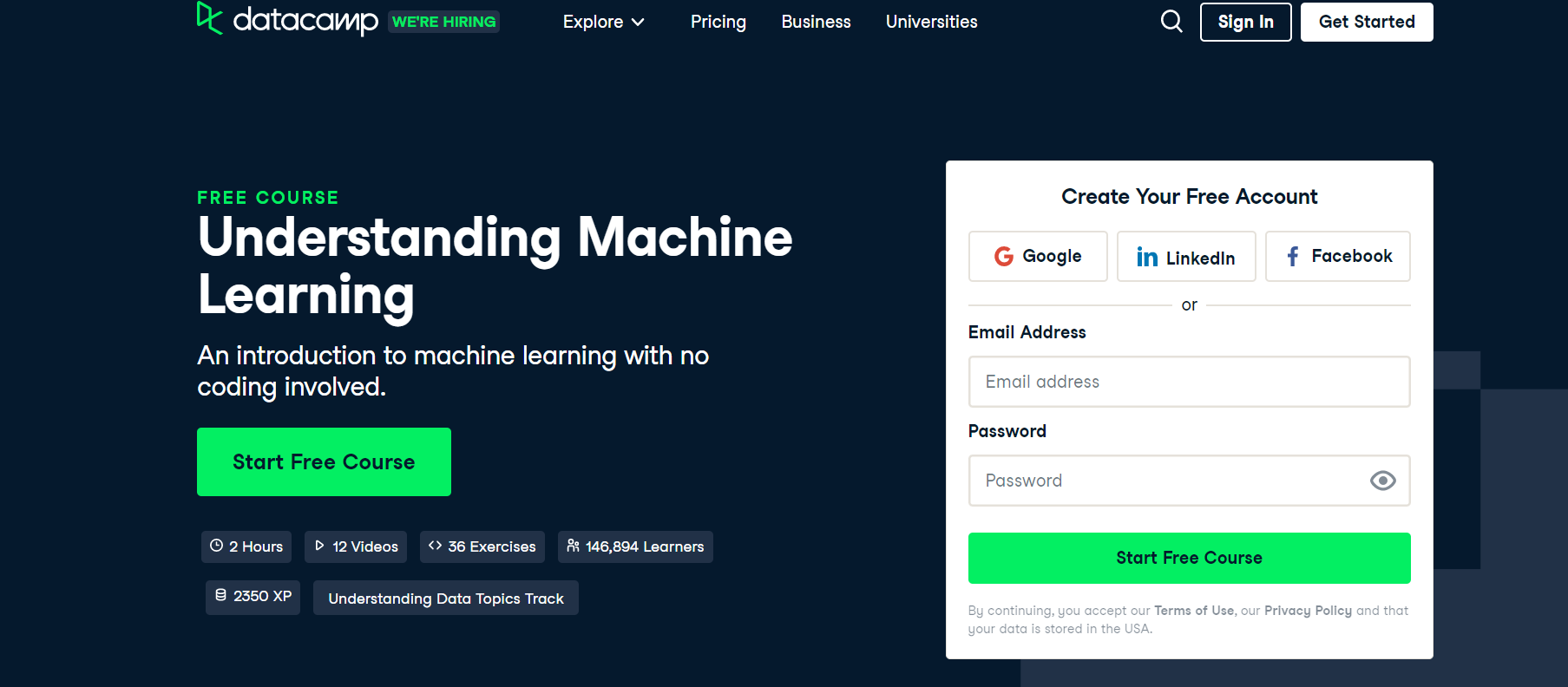
This is a free course on offer from data camp, will roughly take 4 hours to complete, and is a good starting point if you’re an absolute beginner in machine learning. It will take you through the basics of machine learning and should set you up nicely for taking on more advanced courses in the future.
Topics Covered:
- What is machine learning?
- Machine learning models
- Deep Learning
Prerequisites – A stable internet connection
Rating – 4.4
Duration – 4 hours; Self-paced
Certificate – No
Conclusion
Pursuing an online machine learning course or certificate can provide you with the skills and knowledge needed to succeed in this field and can help you stand out in a crowded job market.
The 15 top-ranked online machine learning courses and certificates listed in this article are all offered by reputable institutions and cover a range of topics, from the fundamentals of machine learning to specialized areas like deep Learning and artificial intelligence.
Whether you’re just starting out in the field or looking to expand your knowledge and skills, these online courses and certificates offer a great opportunity to advance your career in machine learning in 2023 and beyond.


